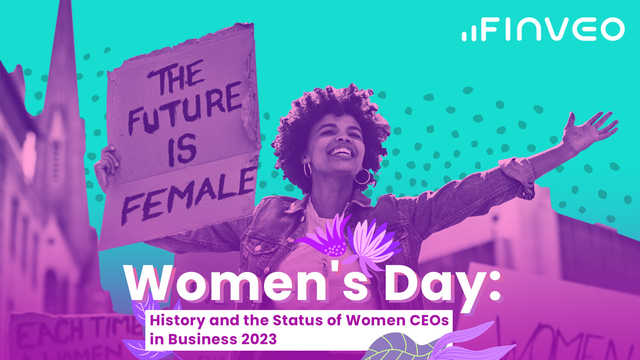On Women’s Day, we celebrate the power of women to inspire and change society. But how much has changed for women in business and the future of CEO roles? Let’s take a look at the status of women in leadership and how they can move forward as an equal gender in business.
What does Women’s Day Mean?
In honoring women on March 8, we’re celebrating their achievements and acknowledging the barriers that still exist for women throughout the world. The goal of Women’s Day is to promote gender equality, increase public awareness, and encourage positive change.
Though women have made important advances in the business world, gender inequality still exists. As we celebrate Women’s Day and increase public awareness, it’s important to highlight the challenges that still exist for women in leadership.
A Brief History of Women in Business
Before looking at where we’re headed as a society that strives to equalize genders in business, let’s first look back at some of the important milestones that have happened in the history of women in business.
The 1920s were a period of growth and change for women in business. In 1921, the first Women’s Institute was established. Women were encouraged to become educated and gain skills to be more financially independent. The 1930s saw the rise of the modern businesswoman. During this time, many women were entering the workforce and getting careers in business. This was correlated with the Great Depression, and many people turned to entrepreneurship as a way to earn an income.
In every industry, women have been laying the groundwork for entrepreneurs for many years. From Ruth Fertel, who aspired to own the best steak restaurant (Ruth's Chris Steak House), to Estée Lauder, who started her cosmetics company in the 1940s, women entrepreneurs have been able to overcome pressure from the economy and the commercial world to be the best.
Top 10 Most Successful Women in Business
These women all have an impressive track record of success. In addition to leading successful companies, they all have a passion for empowering others, such as philanthropy, education, or mentorship. Let’s take a look at who they are and what inspires these powerful women.

Francoise Bettencourt Meyers
Bettencourt Meyers is the wealthiest woman in the world with a net worth of over $70 billion. She is the principal shareholder of L'Oreal, the cosmetics and beauty company her family founded

Alice Walton
Walton is an heir to the Walmart fortune and is currently the wealthiest woman in the United States with a net worth of over $57 billion. Walton also founded the Crystal Bridges Museum of American Art, with the mission to unite the power of art with the beauty of nature.

Zhou Qunfei
Zhou is the founder of Lens Technology, which makes touchscreens for Apple and other tech companies. With a net worth of over $6.3 billion, she is one of the richest self-made women in the world.

Gina Rinehart
Rinehart is an Australian mining magnate who inherited a large stake in her father's company, Hancock Prospecting. She is currently the wealthiest person in Australia with a net worth of over $29 billion.

Zhang Xin
Zhang is the co-founder and CEO of SOHO China, a real estate development company based in Beijing. She is one of the wealthiest women in China with a net worth of over $13 billion.

Oprah Winfrey
Winfrey is a media executive, talk show host, and philanthropist who is widely regarded as one of the most influential women in the world. She has a net worth of over $2.5 billion.

Sheryl Sandberg
Sandberg is the COO of Facebook and the author of the bestselling book Lean In: Women, Work, and the Will to Lead. She is one of the most prominent businesswomen in Silicon Valley, with a net worth of over $1.5 billion.

Marillyn Hewson
Hewson is the former CEO of Lockheed Martin, one of the world's largest defense contractors. During her tenure, she oversaw the development of several high-profile weapons systems and was named one of Fortune's Most Powerful Women in Business.

Mary Barra
Barra is the CEO of General Motors, making her the first woman to lead a major global automaker. She has been credited with revitalizing the company and leading it into the future of electric and autonomous vehicles.

Ginni Rometty
Rometty is the former CEO of IBM, one of the world's largest technology companies. During her tenure, she oversaw the company's transition into cloud computing and artificial intelligence and was named one of Fortune's Most Powerful Women in Business.
The Future of CEO Roles for Women
While things have vastly improved for women in business in the past century, there’s still a long way to go toward gender equality in leadership roles. In fact, CEO positions for women make up just 5% of the total.
According to Fortune magazine, Women CEOs run more than 10% of Fortune 500 companies for the first time in history! This is a huge milestone for women in business, and this is the direction in which society should be moving, as women are capable of doing so much more.
CEO roles are important because they define the direction and goals of a company. It’s also the position that is most often associated with setting an example for gender equality. It’s no secret that there is still much work to be done. Women have proven themselves capable of taking on leadership roles in many fields. CEOs are a great example of this. Historically, women have been underrepresented in the highest ranks of business. But we can see that the future will bring more women CEOs and other leaders. Top-level women in business are making strides toward equality. Women are becoming more visible in senior business positions, such as CEOs or other leading roles in finance, manufacturing, marketing, HR, sales, and more. They are also finding ways to succeed in top-level positions in male-dominated industries, such as technology, engineering, and construction companies.
Women are also seeking opportunities to lead other areas of business, including in non-profit organizations. There are also more opportunities for women to work in businesses that serve women, such as gyms, fitness centers, and health care providers.
Unfortunately, there are still many issues that are happening now, including the pay gap, family leave, and stereotypes that still exist in society. But, CEOs can have a great impact in addressing these issues.
Final Thoughts
Women are increasingly finding ways to succeed in business. As more women become CEOs of large companies, the gender gap in leadership roles is shrinking. There are many ways to celebrate women this Women’s Day, like gifting flowers to important women in our lives and sharing articles about women’s achievements.
But let’s not forget why we celebrate women this day: Women are worth celebrating and have so much to offer as leaders and are making progress toward equality. Let’s celebrate and cherish the power of Women!
*The source of information: Forbes Magazine



















